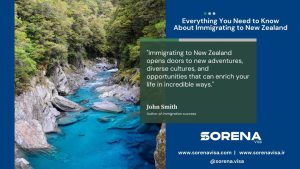Why New Zealand is a Top Study Destination ?
New Zealand is celebrated for its safe environment, welcoming culture, and excellent education system. Ranked among the top peaceful countries globally, it’s a perfect choice for students seeking quality education in a supportive atmosphere. Unlike other destinations, New Zealand emphasizes small class sizes, allowing students to engage closely with faculty and peers.
- Global Recognition: New Zealand’s education system is governed by the New Zealand Qualifications Authority (NZQA), which ensures high-quality standards across all institutions. Degrees from New Zealand are widely accepted worldwide, particularly in industries like healthcare, engineering, and IT.
- Post-Study Opportunities: The country’s post-study work policies are among the most flexible globally, enabling students to secure valuable work experience. These opportunities make New Zealand ideal for individuals looking to establish careers internationally.
- Focus on Research and Innovation: Leading universities, such as the University of Auckland and Massey University, invest heavily in innovation. Fields like artificial intelligence, climate science, and biomedical engineering have gained prominence in New Zealand, attracting students interested in cutting-edge research.

Types of Education Providers
New Zealand’s education system is diverse, offering several pathways to academic and professional success:
- Universities:
- These institutions focus on research-based education and are globally ranked for their academic excellence.
- Example: The University of Waikato stands out for its environmental research programs, while Lincoln University is renowned for its agricultural studies.
- Institutes of Technology and Polytechnics (ITPs):
- ITPs specialize in skills-based programs, offering diplomas and degrees in practical fields like IT, trades, and culinary arts.
- These programs are often structured with industry internships, making graduates job-ready.
- Private Training Establishments (PTEs):
- These institutions cater to niche markets, offering training in areas like aviation, creative arts, and specialized IT certifications.
- PTEs often feature smaller classes, ensuring personalized learning experiences.
- English Language Schools:
- Designed for non-native speakers, these schools help students meet language requirements for academic programs.
- Tip: Some English schools are directly affiliated with universities, providing streamlined transitions to degree programs.
Flexible Study Options
New Zealand’s education system accommodates students with diverse needs:
- Full-Time and Part-Time Programs: Students can tailor their schedules based on their work or personal commitments, ensuring they maintain a healthy balance.
- Blended Learning: Courses combine in-person classes with online modules, allowing for flexibility and convenience.
- Pathway Programs: These programs are ideal for students who need additional academic preparation. For instance, foundation courses help international students transition smoothly into undergraduate studies.
Key Aspects of Studying in New Zealand
Student Visa Requirements
To study in New Zealand, international students must obtain a valid student visa. Here are the key requirements:
- Offer of Place:
- You must have an offer of admission from a New Zealand Qualifications Authority (NZQA)-approved education provider.
- The offer must include details about your course, tuition fees, and program duration.
- Financial Evidence:
- Students should demonstrate access to funds, either through personal savings, scholarships, or family sponsorships. For students with dependents, additional financial proof is required to cover their living expenses.
- Proof that you can cover tuition fees, living expenses (approximately NZD 20,000 per year), and travel costs.
- Medical and Travel Insurance:
- Comprehensive insurance is mandatory to cover hospitalization, doctor visits, and unforeseen travel-related issues.
- English Proficiency:
- Programs often require an IELTS score of 6.0 overall, but postgraduate courses may demand higher scores (6.5–7.0).
- Tip: Students can also consider taking preparatory English language programs if they don’t meet the required score.
- Character and Health Certificates:
- You may be required to provide a police clearance certificate and undergo a medical examination to ensure you meet New Zealand’s character and health standards.

Cost of Studying in New Zealand
The cost of studying in New Zealand depends on the type of program, level of study, and location. Here’s a detailed breakdown:
| Expense | Estimated Cost (NZD) | Details |
| Tuition Fees | 22,000–35,000/year | Undergraduate programs (varies by field). |
| 26,000–45,000/year | Postgraduate programs like MBAs or master’s degrees. | |
| 12,000–18,000/year | Vocational courses or foundation studies. | |
| Living Expenses | ~20,000/year | Covers accommodation, food, transportation, and utilities. |
| Accommodation | 800–1,200/month | Varies by type (student dorms, private rentals, homestays). |
| Health Insurance | 400–700/year | Mandatory for all international students. |
| Miscellaneous Costs | 2,000–5,000/year | Covers textbooks, travel, and leisure activities. |
Budgeting Tip: Students are allowed to work part-time (up to 20 hours per week) during academic terms, which can help offset living expenses.
Popular Fields of Study in New Zealand
New Zealand’s education system is designed to cater to global demand. Below are some of the most sought-after fields:
- Engineering and Technology:
- Programs in civil, mechanical, and software engineering are highly regarded.
- Universities like the University of Auckland and the University of Canterbury are pioneers in these fields.
- Focus areas include renewable energy, robotics, and software development.
- Internship opportunities ensure practical experience.
- Business and Management:
- Programs often emphasize innovation and entrepreneurship, preparing students for leadership roles in multinational corporations.
- MBA and business administration programs offer a mix of theoretical and practical training.
- Institutes like Otago Polytechnic, Future Skills, Toi Ohomai, AUT and Victoria University of Wellington are well-known for their business faculties.
- Health Sciences and Nursing:
- With a global shortage of healthcare workers, New Zealand’s programs in medicine, nursing, and public health are in high demand.
- Opportunities for hands-on clinical training make these programs appealing.
- Many universities partner with hospitals and clinics, offering students practical exposure.
- Graduates are eligible for priority residency in New Zealand due to high demand in healthcare fields.
- Environmental Sciences and Sustainability:
- New Zealand is a global leader in sustainability and conservation studies.
- Programs focus on renewable energy, environmental management, and marine biology.
- Ideal for students passionate about addressing climate change and conservation.
- Creative Arts and Design:
- Courses in graphic design, filmmaking, and animation are thriving, with New Zealand being a global hub for creative industries.
- Programs in animation, filmmaking, and graphic design benefit from New Zealand’s vibrant creative industry, exemplified by projects like The Lord of the Rings.
Benefits of Studying in New Zealand
Global Employability
New Zealand’s education system is globally recognized for its high academic standards, ensuring that students graduate with skills that meet international demands. Degrees and certifications from New Zealand institutions are valued by employers worldwide, especially in fields like IT, engineering, healthcare, and business.
- Internship Opportunities: Many programs incorporate internships or co-op placements, allowing students to gain real-world experience while studying.
- Post-Study Work Visas: Upon graduation, students can apply for a Post-Study Work Visa, granting them up to three years to work in New Zealand and enhance their professional profiles.
Quality of Life
New Zealand offers an exceptional quality of life, which is a significant draw for international students.
- Safety and Inclusivity: Ranked among the safest countries globally, New Zealand welcomes students from diverse cultural backgrounds with open arms.
- Outdoor Adventures: From stunning beaches and mountains to vibrant cities, the country offers endless opportunities for exploration and relaxation.
- Work-Life Balance: New Zealand emphasizes work-life balance, enabling students to focus on both academic and personal growth.
Pathways to Permanent Residency
One of the most attractive benefits of studying in New Zealand is the potential for permanent residency.
- Graduates with in-demand skills can transition to residency through the Skilled Migrant Category or Work to Residence pathways.
- Students who complete qualifications in areas listed on New Zealand’s skill shortage list are highly favored for residency.
Section 4: Scholarships and Financial Aid Opportunities
Types of Scholarships
New Zealand offers various scholarships to support international students:
- Government-Funded Scholarships:
- New Zealand International Scholarships (NZIS): These fully funded scholarships prioritize students from developing nations.
- Manaaki New Zealand Scholarships: Targeted at students from developing nations.
- University-Specific Scholarships:
- University of Auckland International Student Excellence Scholarship: Scholarships like the University of Auckland Excellence Award provide significant financial support.
- Victoria University Tongarewa Scholarship: Offers partial funding for undergraduate and postgraduate students.
- Private and Industry Scholarships:
- Various organizations and companies sponsor scholarships for students in specialized fields like IT, engineering, and healthcare.
Tip: Research early and tailor applications to scholarship criteria to increase your chances of success.
Application Process
The scholarship application process typically involves:
- Research: Identify scholarships that match your academic profile and career goals.
- Prepare Documents: Provide academic transcripts, personal statements, and recommendation letters.
- Apply Early: Submit applications before deadlines to maximize chances.
Tips for Securing Scholarships
- Maintain excellent academic performance.
- Highlight extracurricular activities, leadership roles, or community involvement.
- Tailor your personal statement to reflect how the scholarship aligns with your goals.
Reducing Financial Burden Through Work
Students are allowed to work part-time (up to 20 hours per week) during academic terms and full-time during holidays. These opportunities not only help cover living expenses but also provide valuable work experience in fields like hospitality, retail, and administration.
Life as an International Student in New Zealand
Accommodation Options
Finding the right place to live is an essential part of a student’s experience in New Zealand. The country offers several options tailored to different budgets and lifestyles:
- On-Campus Accommodation:
- University-managed dormitories provide a convenient option for students.
- Includes meal plans and utilities, creating a stress-free living experience.
- Average Cost: NZD 200–350 per week.
- Homestays:
- Live with a local family to experience New Zealand culture firsthand.
- Meals are usually included, and it’s an excellent option for younger students.
- Average Cost: NZD 250–300 per week.
- Private Rentals:
- Ideal for students seeking independence. Options range from shared flats to studio apartments.
- Average Cost: NZD 150–400 per week, depending on location.
Working While Studying
New Zealand’s student visa allows part-time work, making it easier for students to support themselves:
- Work Limits:
- 20 hours per week during academic terms.
- Full-time during scheduled holidays.
- 40 Hours per week for PhD Students during academic terms and scheduled holidays.
- Popular Part-Time Jobs:
- Hospitality (cafes, restaurants).
- Retail (stores, supermarkets).
- Administration roles or internships relevant to the student’s field of study.
Tip: Working part-time also helps students gain valuable local experience and improve their English language skills.
Social and Cultural Integration
New Zealand is known for its friendly and welcoming culture, which makes it easier for international students to feel at home.
- Join Student Clubs: Most universities have clubs focused on sports, arts, or cultural activities.
- Attend Cultural Events: Participate in events like Matariki (Māori New Year) and local festivals.
- Explore the Outdoors: From hiking trails to adventure sports, New Zealand offers endless opportunities for recreation.
Building connections through social activities not only enhances your experience but also expands your professional and personal networks.
Section 6: Common Challenges and Solutions
Adjusting to a New Culture and Lifestyle
International students often face culture shock and homesickness.
- Challenge: Adapting to New Zealand’s lifestyle, food, and social norms.
- Solution:
- Participate in orientation programs offered by universities.
- Engage with local communities and other international students to build connections.
Navigating Visa and Immigration Processes
The student visa application process can be overwhelming for some.
- Challenge: Understanding requirements, deadlines, and document preparation.
- Solution:
- Sorena Visa simplifies this process by providing expert guidance at every step, ensuring all paperwork is accurate and deadlines are met.
Balancing Work and Study
Balancing part-time work with academic responsibilities can be challenging.
- Challenge: Managing time effectively between coursework, jobs, and personal life.
- Solution:
- Use time management tools like planners or apps.
- Prioritize academic obligations and ensure work hours don’t interfere with studies.
Managing Finances
Studying abroad can strain financial resources.
- Challenge: Covering tuition, living expenses, and unexpected costs.
- Solution:
- Plan and budget carefully before moving.
- Take advantage of part-time work opportunities and student discounts.
FAQs About Studying in New Zealand
Here are answers to some of the most commonly asked questions about studying in New Zealand:
- How much does it cost to study in New Zealand?
The cost depends on the level of study and field. Undergraduate programs range from NZD 22,000–35,000/year, while postgraduate programs can cost NZD 26,000–45,000/year. Living expenses are approximately NZD 20,000/year. - Can international students work while studying?
Yes, student visa holders can work up to 20 hours per week during academic terms and full-time during holidays. This is a great way to support living costs and gain work experience. - Are scholarships available for international students?
Yes, New Zealand offers a variety of scholarships, such as the New Zealand International Scholarships and university-specific options like the University of Auckland International Student Excellence Scholarship. - What are the pathways to permanent residency after studying?
Graduates can apply for a Post-Study Work Visa, which allows them to stay in New Zealand and gain work experience. Skilled graduates in high-demand industries can transition to permanent residency through the Skilled Migrant Category. - How does Sorena Visa assist with the application process?
Sorena Visa, led by Yashua Arjmand, provides personalized support, from choosing the right course and institution to ensuring your student visa application is complete and accurate.
Section 8: Conclusion
Studying in New Zealand is a life-changing experience, offering world-class education, abundant work opportunities, and a vibrant cultural environment. From globally recognized universities to flexible post-study pathways, New Zealand is a destination that supports students’ academic and career aspirations.
This guide has covered all essential aspects, including the education system, visa requirements, scholarship opportunities, and life as an international student. However, navigating this journey requires careful planning and expert guidance.
That’s where Sorena Visa, led by migration expert Yashua Arjmand, comes in. Sorena Visa specializes in providing end-to-end support, ensuring your application is not only successful but also stress-free. Whether it’s finding the right course, managing your visa application, or helping you transition to residency, Sorena Visa is your trusted partner.
Call-to-Action (CTA)
Take the next step in your journey today:
- Visit: www.sorenavisa.ir.
- Call: 02191094024 for expert advice tailored to your needs.
- Follow us: Stay connected on Instagram (@sorena.visa), LinkedIn (Yashua Arjmand), and Telegram for the latest updates.
References
- Immigration New Zealand
https://www.immigration.govt.nz/ - Study in New Zealand (Education New Zealand)
https://www.studyinnewzealand.govt.nz/ - New Zealand Qualifications Authority (NZQA)
https://www.nzqa.govt.nz/ - New Zealand Now
https://www.newzealandnow.govt.nz/ - University of Auckland
https://www.auckland.ac.nz/ - University of Otago
https://www.otago.ac.nz/ - Victoria University of Wellington
https://www.wgtn.ac.nz/ - Lincoln University
https://www.lincoln.ac.nz/ - Manaaki New Zealand Scholarships
https://www.nzscholarships.govt.nz/ - QS World University Rankings
https://www.topuniversities.com/ - UNESCO Institute for Statistics
http://uis.unesco.org/ - New Zealand Tourism
https://www.newzealand.com/ - Sorena Visa Official Website
https://www.sorenavisa.ir/





